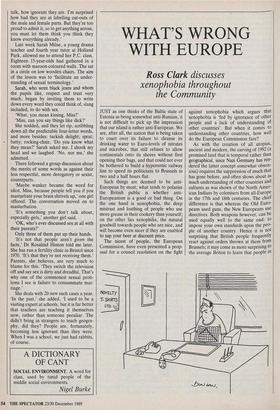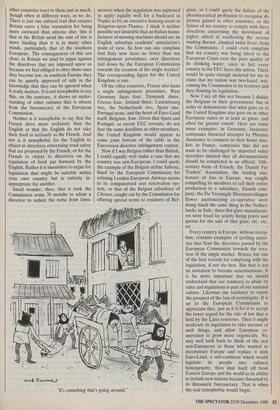WHAT'S WRONG WITH EUROPE
Ross Clark discusses
xenophobia throughout the Community
JUST as one thinks of the Baltic state of Estonia as being somewhat anti-Russian, it is not difficult to pick up the impression that our island is rather anti-European. We are, after all, the nation that is being taken to court over its failure to cleanse its drinking water to Euro-levels of nitrates and microbes, that still refuses to allow continentals onto its shores without first opening their bags, and that could not ever be bothered to build a hypersonic railway line to speed its politicians to Brussels in two and a half hours flat.
Such things are deemed to be anti- European by most; what tends to polarise the British public is whether anti- Europeanism is a good or bad thing. On the one hand is xenophobia, the deep mistrust and loathing of people who use more grease in their cookery than yourself; on the other lies xenophilia, the natural goodwill towards people who are nice, and will become even nicer if they are enabled to sup your beer at discount price.
The nicest of people, the European Commission, have even presented a prop- osal for a council resolution on the fight against xenophobia which argues that xenophobia is 'fed by ignorance of other people and a lack of understanding of other countries'. But when it comes to understanding other countries, how well do the European Commission fare?
As with the creation of all utopias, ancient and modern, the carving of 1992 (a promised land that is temporal rather than geographical, since Nazi Germany has ren- dered the latter concept somewhat obnox- ious) requires the suppression of much that has gone before, and often shows about as much understanding of other countries and cultures as was shown of the North Amer- ican Indians by colonisers from all-Europe in the 17th and 18th centuries. The chief difference is that whereas the Old Euro- peans used guns, the New Europeans use directives. Both weapons however, can be used equally well to the same end: to impose your own standards upon the peo- ple of another country. Hence it is not surprising that British people frequently react against orders thrown at them from Brussels; it may come as more surprising to the average Briton to learn that people In
other countries react to them just as much, though often in different ways, as we do. There is just one cultural trait that ensures Britain earns a false reputation for being more awkward than anyone else; this is that in the British mind the rule of law is more binding than it is in many other minds, particularly that of the southern European. The consequences of this are clear: in Britain we tend to argue against the directives that are imposed upon us because we feel obliged to obey them once they become law; in southern Europe they can be quietly approved of safe in the knowledge that they can be ignored when it really matters. It is not xenophobic to say this; on the contrary, it shows an under- standing of other cultures that is absent from the bureaucracy of the European Commission.
Neither is it xenophobic to say that the French drive more recklessly than the English or that the English do not take their food as seriously as the French. And nor is it xenophobic for the English to object to directives concerning road safety that are proposed by the French, or for the French to object to directives on the regulation of food put forward by the English. Rather it is insensitive to argue for legislation that might be suitable within your own country but is entirely in- appropriate for another.
Small wonder, then, that it took the CommiSsion some 70 months to adopt a directive to reduce the noise from lawn-
mowers when the regulation was supposed to apply equally well for a backyard in Naples as for an executive housing estate in Kingston-upon-Thames. I think it neither possible nor desirable that an Italian manu- facturer of mowing machines should see an English suburban residents' association's point of view. So how can one complain that Italy now faces no fewer than ten infringement procedures over directives laid down by the European Commission towards the creation of the single market? The corresponding figure for the United Kingdom is one.
Of the other countries, France also faces a single infringement procedure, West Germany faces four, Denmark three, Greece four, Ireland three, Luxembourg two, the Netherlands two, Spain one, Portugal none, and the heart of Euro-Land itself, Belgium, four. Given that Spain and Portugal, as recent EEC recruits, do not face the same deadlines as other members, the United Kingdom would appear to come joint bottom of the table in the Eurovision directive infringement contest.
Now if I was Belgian rather than British, I could equally well make a case that my country was anti-European. I could quote the example of the Belgian airline Sabena, fined by the European Commission for refusing London European Airways access to its computerised seat reservation sys- tem, or that of the Belgian subsidiary of Citroen, caught out by the Commission for offering special terms to residents of Bel- `It's something that's going around.' glum, or I could quote the failure of the pharmaceutical profession to recognise di- plomas gained in other countries, or the failure of my country to comply with three directives concerning the movement of piglets aimed at eradicating the serious wasting disease, classical swine fever, from the Community. I could even complain that my country was being taken to the European Court over the poor quality of its drinking water, since in fact every country in the EEC faces this action. There would be quite enough material for me to claim that my nation was two-faced, wel- coming the Commission to its territory and then flouting its legislation.
Now I say all this not because I dislike the Belgians or their government, but in order to demonstrate that what goes on in the United Kingdom also goes on in other European states to at least as great, and often far greater extent. Here are some more examples: in Germany, insurance companies thwarted attempts by Phoenix Assurance to compete in their home mar- ket; in France, companies that did not want to be challenged by imported video recorders insisted that all documentation should be completed in an official, 18th- century form of French; the Danish Fur Traders' Association, the leading auc- tioneer of furs in Europe, was caught compelling its members to sell their entire production to a subsidiary, Danish com- pany; the De Verenigde Bloemenveilingen flower auctioneering co-operative were doing much the same thing in the Nether- lands; in Italy, three flat-glass manufactur- ers were fined for jointly fixing prices and quotas for the sale of that glass; etc, etc, etc . . . .
Every country in Europe, without excep- tion, contains examples of spoiling activi- ties that flout the directives passed by the European Commission towards the crea- tion of the single market. Britain has one of the best records for complying with the legislation, if not the best. But that is not an invitation to become sanctimonious. It is far more important that we should understand that our tendency to abide by rules and regulations is part of our national culture. Likewise our tendency to resent the prospect of the loss of sovereignty. It is up to the European Commission to appreciate that, just as it is for it to accept the lower regard for the rule of law that is held by the Latin countries. Then it might moderate its legislation to take account of such things, and allow European co- operation to grow more organically. We may well look back to think of the real anti-Europeans as those who wanted to deconstruct Europe and replace it with Euro-Land, a sub-continent which would legislate its people into cultural homogeneity, then shut itself off from Eastern Europe and the world as its ability to include new nations became thwarted by its dinosauric bureaucracy. That is when the real xenophobia would begin.











































































































 Previous page
Previous page